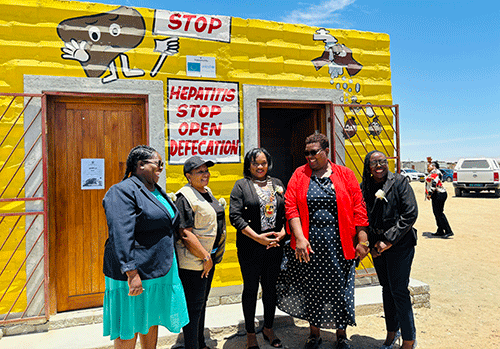SWAKOPMUND – Poor hygiene practices are a major contributor to several endemic and epidemic diseases in southern Africa and the world at large. Namibia is also feeling its effects as SADC continues to report recurrent diarrhoea and cholera outbreaks due to poor sanitation.
Between October 2022 to October 2023, the Erongo region reported 1 334 cases of diarrhoea with blood, resulting in the death of four people, one of whom was under five years old and three were above 18 years old, according to Erongo governor Neville Andre.
“The region reported 19 958 cases of diarrhoea without blood and with no death. This is an alarming situation that needs an urgent solution on water, sanitation and hygiene in the Erongo region if not the country at large,” he said.
Andre made the remarks during the commemoration of World Toilet Day, which was celebrated in Swakopmund on Monday.
He emphasised the need to wash hands with soap and water, as it is the single most effective and inexpensive way to prevent all diseases.
“I am confident the Namibia Water and Sanitation Sector Program (NWSSP) and other development partners, including communities, can find solutions to achieve access to adequate sanitation and hygiene for all, and end open defecation in our country by 2030,” he said.
Also speaking at the event, health minister Dr Kalumbi Shangula, said poor hygiene practices continue to be a major concern for the country, especially in informal settlements and rural areas, where there is a lack of proper sanitation and water.
World Toilet Day is an annual United Nations observance, promoted through a worldwide public campaign that encourages action to tackle the global sanitation crisis, first observed in 2001. More than 2.5 billion people around the world have no access to improved sanitation.
Shangula highlighted that Namibia also experienced an outbreak of Hepatitis E since December 2017, with 6 517 cases reported and 55 lives lost.
However, through a commitment from the ministry, its development partners and the involvement of the Namibian community, the country managed to control the outbreak, declaring it over in 2022. “We need to change that reality and break the vicious cycle of diseases. This day aims to mobilise global, national and community efforts to improve hygiene, change social norms and eliminate open defecation by 2030. There is a global sanitation crisis, and the world is working too slowly to solve it. Right now, we are seriously off track to meet Sustainable Development Goal (SDG 6): safe toilets and water for all by 2030,” said Shangula.
According to him, World Toilet Day is about getting the world on track by taking much faster actions.
Governments and big institutions must be accountable for delivering on their promises.
He called upon everyone to take ownership of ensuring safe toilet and water usage to fast-track progress towards achieving SDG 6.
“Namibia has made strong progress in the water sector, where over 93% of the population now has access to improved water supply. The challenge now lies in the lack of progress on sanitation – National Demographic Health Survey (NDHS, 2013). On average, more than half of the Namibian population practices open defecation, causing negative effects on public health, particularly children’s health and pregnant women,” explained the minister.
He pointed out that access to safe water, sanitation and hygiene is the most basic human need for health and well-being. Sustainable management of water resources and access to safe water, sanitation and hygiene are essential for unlocking economic growth and productivity, providing significant leverage for existing investments in health and education.
“SDG 6 calls for the global community to achieve access to adequate and equitable sanitation and hygiene for all, and end open defecation, paying special attention to the needs of women and girls, and those in vulnerable situations by 2030,” he said.
– edeklerk@nepc.com.na


